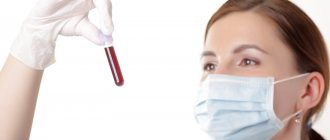Women's periods are often accompanied by nagging pain, and in most cases this is not a deviation. But heavy bleeding during menstruation often signals a disorder in the body that should not be ignored. It is important to distinguish between menstrual-like bleeding and simply heavy discharge, and also to know what to do in such a situation.
- 3.1 Hemostatic agents
Review of hemostatic agents prescribed for menorrhagia
Bleeding during menstruation leaves women in shock. But if you immediately consult a doctor, you will be able to quickly stop the process and prevent negative health consequences. As first aid, patients are prescribed the following hemostatic drugs for heavy periods:
- Dicynone.
- Tranexam.
- Vikasol.
- Etamzilat.
- Ascorutin.
- Diferelin.
Dicynone and Ascorutin are sold without a prescription. Other medications can only be purchased if you have a detailed prescription from a doctor.
Dicynone
The drug comes in the form of tablets and ampoules. When taking Dicinon orally, a woman with menorrhagia takes 1–2 tablets 2–3 times a day.
The medicine is effective for fibroids and capillary and parenchymal blood loss. In moderate dosages, it is taken for thromboembolism, thrombosis, porphyria and allergic reactions to components, or not used at all if the disease is severe.
https://youtu.be/WPNsDoaDySM
Tranexam
Modern tablets for bleeding during menstruation Tranexam make the discharge moderate and exhibit antihistamine, antitumor and anti-inflammatory effects.
The recommended dosage regimen is 3 tablets per day with an interval of 6 hours. Duration of therapy – 3 days.
The side effects of Tranexam are:
- Thrombosis of deep veins and cerebral vessels.
- Allergy to constituent components.
- Bleeding in the meninges.
- Pathological kidney function.
Vikasol
An analogue of synthetic vitamin K belongs to the older generation of drugs. It replenishes the deficiency of a useful substance and accelerates blood clotting.
For heavy periods, Vikasol is taken in the amount of 2 tablets per day. Your gynecologist will advise you on how long to use the medication. Treatment is carried out strictly under medical supervision.
Side effects of Vikasol are manifested by skin reactions:
- Rash.
- Itching.
- Redness.
- Urticarial spots.
- Possible bronchospasm.
Etamzilat
A cheap analogue of Dicinon stabilizes blood microcirculation and strengthens blood vessels.
In the process of treating menorrhagia with Etamsylate, thromboplastin is formed in the body. The substance reduces bleeding, but does not reduce blood clotting time. In terms of thrombosis, thromboplastin is safe. Etamzilat acts quickly, the effect is felt 15 minutes after administration.
Askorutin
The list of hemostatic tablets for heavy periods includes Ascorutin (ascorbic acid + rutin, vitamins C and P, respectively).
The drug stops heavy bleeding and has a beneficial effect on blood vessels. For menorrhagia, Ascorutin is taken 4 tablets per day for a 2-3 week course.
Despite the vitamin composition of the drug, it can cause quite unpleasant phenomena. A person experiences nausea, vomiting, and insomnia. Allergic problems and increased blood pressure are possible.
https://youtube.com/watch?v=mMI6NVaR1yo
Diferelin
You can take Diferelin to stop heavy periods only with the consent of your doctor.
Drug intolerance, dosage violations and side effects lead to depression, migraines and allergies. Diferelin has few contraindications:
- Breast-feeding.
- Osteoporosis.
- Triptorelin intolerance.
How to reduce heavy periods
If the discharge begins to intensify and your general health deteriorates, you should definitely call an ambulance. Before the ambulance arrives, you can try to reduce the amount of uterine bleeding on your own. To do this, you need to use these recommendations.
- To stop blood loss, you need to lie down in a horizontal position and raise your legs above body level; to do this, you can put a pillow under them.
- To reduce the intensity of bleeding, you need to apply an ice pack or frozen object to the lower abdomen for no more than a quarter of an hour.
- To replace blood loss, you need to drink more fluids. This could be water, juice, sweet tea.
https://youtu.be/gWSfpcbp-fk
Drugs
For heavy periods, medications are prescribed to stop bleeding and alleviate the patient’s general condition. Hemostatic drugs are part of complex therapy. It is aimed at eliminating not only alarming symptoms, but also treating its cause. Only a doctor can prescribe such medications.
| A drug | Description |
| Calcium glucanate | This drug increases the blood's ability to clot. It is produced in the form of a solution for injections and in tablet form. Treatment begins with intravenous administration of the solution in a dosage of 5 to 15 ml, and then continues with tablets, but not more than 6 pieces. per day. You need to take the medications after meals. |
| Ascorutin (Rutascorbin) | The tablets help reduce heavy periods by strengthening the vascular walls and reducing the fragility of blood vessels. You need to take 1-2 tablets several times a day. To obtain the effect, the product must be taken for at least 3 weeks. More often prescribed for preventive purposes and after intrauterine interventions. |
| Oxytocin | The product is used to improve the contractility of the uterus and to increase the excitability of its muscle fibers. The drug must be administered into a vein or intramuscularly. If administered intravenously, the effect is felt immediately. |
| Aminocaproic acid | Reduces blood activity. It is used only for hospital treatment. Release form: powder. 100 ml of dissolved product is dripped intravenously up to 5 times a day. Breaks between procedures should not exceed 4 hours. Single dosage – 2-3 g. |
| Vikasol | This is a medicine for normalizing blood clotting, which is a synthetic substitute for vitamin K. Release form: ampoules of 1 ml solution and tablets. You need to drink 4 tablets. Inject up to 2 ampoules per day. The effect after administration occurs within 12-14 hours. Prescribed when the cause of bleeding is vitamin K deficiency. |
| Dicynone (Etamsylate) | The medicine activates blood clotting processes and promotes vasoconstriction, but does not contribute to the formation of blood clots. If the drug is injected into a vein, the effect is felt after 20 minutes. If you take tablets, the result will be visible after 3 hours. If the bleeding is heavy, especially on the first day of your period, you can take up to 3 tablets at a time. The course can be prescribed for 10 days. If a woman is predisposed to uterine bleeding, she is prescribed Dicinon for preventive purposes. The drug has a number of side effects (general weakness, dizziness, heartburn, high blood pressure, allergic reactions). The drug is contraindicated in case of individual intolerance to its components, diseases of the blood, liver, kidneys and increased blood clotting. It is prescribed for metrorrhagia and severe bleeding in women with an IUD. It is prohibited for pregnant and lactating women. |
| Tranexam | Stops bleeding, relieves inflammation and eliminates swelling. It is used when a clot that has formed at the site of a bleeding vessel dissolves. You need to take the medicine for no more than 4 days, maximum 6 tablets. per day in 2-3 doses. Tranexam should be injected into a vein every 8 hours. The drug should not be taken if you have thrombosis, kidney disease, problems with color perception or individual intolerance. In some cases, tablets can cause vomiting, nausea, dizziness, tachycardia, chest pain, weakness and allergic reactions. |
| Iron supplements, vitamin C, folic acid | This mix helps restore lost blood volume and cure anemia. Thanks to vitamin C, ferrum is absorbed much faster. Folic acid helps form complete hemoglobin and affects the division of new cells. |
| Diferelin | The drug promotes tumor regression. It is used only when the cause of abundant regula is fibroids or endometriosis. |
| No-shpa, Papaverine, Ketorol, etc. | It is used if heavy periods are accompanied by pain and cramps. |
Folk remedies
To make your periods less heavy, you can use folk remedies with your doctor’s permission. Many of them are easy to prepare at home. Here is a description of the most popular recipes that will help reduce bleeding during menstruation.
- You can eat lemons, which contain a large amount of vitamin C. You need to eat at least 2 citrus fruits per day. They can be dipped in sugar or eaten without any additives.
- Water pepper helps increase blood clotting and relieve pain, and this medicine also speeds up the wound healing process. To prepare the product you need 2 tables. lie dry raw materials, pour 0.4 liters of boiling water, leave for 30 minutes. Take 1 table. lie every 2 hours..
- An infusion from the cuff helps stop blood loss, reduce pain, and also has an astringent and wound-healing effect. To prepare the medicine, you need to pour 30 g of dry raw material into 0.5 liters of boiling water, leave for 1 hour. Drink three times a day until the unpleasant symptoms disappear.
- Tea from shepherd's purse will help stop bleeding, and baths from this plant have the same effect. To prepare the infusion, you need to pour 20 g of dry raw materials with 2 cups of boiling water, leave for 1 hour. Drink in 3 doses. Take before meals. For a sitz bath, you need to pour a liter of boiling water over 2 tables. lie herbs. You need to sit in such a bath for a quarter of an hour once a day. Repeat the procedures for 5 days.
- Nettle will help maintain the tone of the uterus. To obtain this effect, you need to drink an infusion from this plant. To prepare it you need 1 tablespoon. herbs pour 0.5 liters of water and leave for a third of an hour, then strain. Drink 0.1 liter at a time.
- You can reduce the intensity of your periods with the help of spices. Cinnamon has a similar effect. 3 table. lie ground cinnamon should be poured into a glass of warm water and drunk hourly until the discomfort disappears.
- You can buy a ready-made tincture of Lagochilus at the pharmacy. It is diluted with water in a ratio of 1:5 and drunk three times a day.
- From ready-made pharmacy tinctures, tincture of water pepper helps with blood loss, which should be drunk three times a day, 30 drops.
- You can drink decoctions of burnet, yarrow or peppermint. To prepare a healing potion from any of these plants, you need 1 tablespoon. dry raw materials, pour a glass of boiling water and 15 minutes. boil in a water bath. The resulting decoction is filtered and taken half an hour before meals in the middle of the menstrual cycle. Drink for 2 weeks.
- Corn silk has a good hemostatic effect. To prepare medicine from them, you need 1 tablespoon. dry raw materials, pour 1 cup of boiling water and take 1 tablespoon. three times a day.
- In the fight against heavy periods, acupuncture practices can be used; in particular, to reduce the intensity of the discharge, you can lightly press on the point, which is located in the hollow between the tip of the nose and the upper lip. This procedure must be repeated 60 times a day.
- The day before your period or during its onset, you need to brew yourself tea from viburnum, raspberries and mint.
- During heavy periods, you should drink oat infusion instead of water. To prepare it, 2 tablespoons. oats, pour 0.5 liters of boiling water and boil for 20 minutes, add 50 g of chopped root parsley. Leave and strain.
It is impossible to stop bleeding solely with folk remedies, as this can cause harm to health. You can resort to alternative medicine only on the recommendation and with the permission of your doctor.
https://youtu.be/ewqHGZs9Oic
Lifestyle correction
Women with heavy blood loss during menstruation should stop drinking alcoholic beverages, coffee and strong teas while the problem is being eliminated. If you have an active sports life, you need to give up training or significantly reduce its intensity for the period of regulation. It is especially necessary to stop lifting weights.
To reduce the amount of bleeding during menstruation, you need to avoid taking baths, going to the sauna, bathhouse, and any thermal procedures. Warming physiotherapy and active insolation should be avoided.
Other
In the case of pathological bleeding, it makes no sense to prescribe reducing drugs. The only correct solution is curettage. This is the removal of blood clots mechanically, which restores the contractility of the reproductive organ. If the blood loss is critical, an additional transfusion of blood, its components or plasma is performed.
If bleeding began at puberty, curettage is not performed. For teenage girls, heavy discharge is stopped with the help of medications. Combined oral contraceptives, which have a hemostatic effect, will help prevent disruptions in the menstrual cycle. They should not be taken according to the classical scheme, when they drink 1 tablet. per day, and immediately several tablets at short intervals.
https://youtu.be/qw1oMQcY9uo
Normal discharge during menstruation
To distinguish pathological bleeding from natural bleeding, you should know what is acceptable. Menstruation is a natural discharge that is normal and physiological. It has the following characteristics:
Duration – 3 – 7 days. The period from the first day of menstruation to the beginning of the next takes 21 - 35 days and is defined as the menstrual cycle. On average it is 28 days.
- The first day or two, menstrual bleeding is moderate, then for several days it is heavy, and in the last days it becomes more scanty. The total volume of blood excreted through menstrual flow should not exceed 80 ml. A higher rate leads to the development of anemia.
- Menstruation is typical for women of the reproductive period, with the exception of pregnant and breastfeeding women. It appears regularly from menarche (the first period, coming at the age of 12 - 15 years) and until menopause (45-55 years).
- Painless. Mostly, discharge during menstruation is not accompanied by pain. But in some cases, painful sensations are acceptable, which is due to the characteristics of the body. In any case, pain requires attention from a gynecologist.
- Bloody discharge in the first days has a scarlet tint, which towards the end changes to dark red or brown.
- Blood may be released in the form of clots, often dark in color, but they should not be large. This is how the sloughed endometrium or clotted blood comes out.
Normally, menstruation comes after an equal number of days, in a moderate volume and the same for each cycle, which can be seen by the number of pads or tampons used.
We recommend reading about the anovulatory menstrual cycle. From the article you will learn about which cycle is considered anovulatory, the causes and symptoms of lack of ovulation, and treatment methods.
And here is more information about how to distinguish uterine bleeding from menstruation.
Why are periods heavy and long?
Some women consult a gynecologist with complaints of excessively heavy periods, which may be accompanied by severe pain or not cause discomfort at all. There are many reasons for excessive bleeding - from hidden but easily treatable diseases to serious pathological processes. These include:
- pathological processes in the uterine cavity;
- childbirth, abortion;
- intrauterine device;
- hormonal disbalance;
- hypovitaminosis, diets;
- taking medications.
Heavy bloody periods are an accompanying symptom of myomatosis, a lesion of the uterus in which the thickness of the endometrium and the shape of the uterus as a whole changes. Endometriosis is another disease that affects the uterus and causes heavy discharge during the menstrual period. With the disease, the endometrium grows to such an extent that it can spread beyond the uterus - to the walls of the intestines or other neighboring organs. Endometriosis is caused by excess estrogen. A specific feature of the disease is bleeding in the middle of the cycle.
The presence of many clots during menstruation can be caused by a recurved or saddle-shaped uterus. The bend of the uterus occurs when the outflow of blood is disrupted, due to which it has time to coagulate. The discharge will be very dark, with an unpleasant odor and numerous clots. Their excessive amount should worry the patient during menopause. The sudden, causeless appearance of clots in women after 50 years of age indicates an oncological disease.
Menstruation may be accompanied by heavy discharge after childbirth, depending on the course of labor and the method of delivery. This manifestation also worries women who breastfeed their baby for more than 1.5-2 years. During lactation, menstruation is usually absent, and with the completion of breastfeeding, the cycle is restored. In the first 1-2 months after finishing breastfeeding, these women may encounter problems with changes in the amount of menstrual flow.
Changes in the amount of menstrual blood released are also observed in women with an IUD (intrauterine device) installed. Some pharmaceutical drugs, such as Aspirin, affect the duration of the cycle and the amount of blood loss. Blood thinners for thrombosis have a similar effect.
A change in the volume of blood loss is a manifestation of hormonal changes, which are provoked by stress, uncontrolled use of drugs, excessive physical activity, endocrine diseases, etc. Hormonal disorders are a serious problem that requires accurate diagnosis through special tests on different days of the cycle and effective drug therapy.
https://youtu.be/qTklinJC0v8
Menstrual flow is normal for girls and women of reproductive age. If during all the days of menstruation the body loses 50–80 ml of blood, this indicates a complete cleansing of the uterus. If blood loss exceeds 80 ml, and a woman experiences heavy bleeding during menstruation with clots, there is a risk of developing iron deficiency anemia and more serious diseases.
To prevent the adverse effects of this condition, it is necessary to study the causes of heavy menstruation and first aid methods.
Tips to reduce blood loss
Severe bleeding during menstruation is a serious problem. To improve your well-being, you need to reduce your periods. For this purpose you can use:
- Advice from traditional medicine.
- Hemostatic medications.
- Medicines to restore the body.
Let's talk in more detail about each method.
Traditional methods
The following folk remedies will help stop heavy periods:
- Water pepper. Helps accelerate the clotting of menstrual fluid. It also has a wound healing effect. A spoonful of raw materials is poured with a glass of boiling water and left for 1 hour. You need to drink 3 spoons of infusion before breakfast.
- Lemon. This citrus is great for stopping menstruation at home. It is eaten pure or dipped in sugar.
- Shepherd's purse. This plant helps reduce bleeding during menstruation. With its help, you can reduce the amount of discharge and improve your well-being. To prepare medicinal tea, you need to pour boiling water over the herb and infuse it. One glass of the resulting product is divided into 3 parts, which should be drunk before meals.
- Nettle. Helps a weakened body regain strength. In folk medicine, the plant is used to maintain uterine tone. One spoon of herb should be poured into a glass of hot water and allowed to brew for an hour, then strain and take 0.5 cups once a day.
- Cinnamon. Reduces the intensity of menstrual discharge. With the help of this spice you can stop even very heavy menstrual bleeding. To prepare the medicine, 1 spoon of powder must be dissolved in a glass of warm water. The product should be taken every 30 minutes.
Medicines
If heavy menstrual flow is caused by gynecological pathology, doctors prescribe drugs that stimulate blood clotting.
Dicynon, Vikasol and Tranexam help to quickly stop menstruation. These drugs that stop the flow of menstrual blood have a vasodilating effect. You can reduce heavy periods using these medications in 30 minutes - provided that they were administered intravenously. When used orally, the therapeutic effect occurs after 3 hours.
Stopping severe blood loss with the help of these medications is possible only after consultation with a gynecologist. For heavy menstrual discharge, accompanied by severe pain in the ovarian area, it is recommended to take 3 tablets of one of the remedies.
Preparations for restoring the body
Ascorutin will help reduce the number of periods. This drug has a strengthening effect on blood vessels and also helps reduce capillary fragility.
What to do
Bleeding during menstruation, as well as during any other period, cannot be ignored. In addition to the fact that it is a signal of problems in the body, blood loss itself can have serious consequences. If suspicious symptoms are detected, you should immediately contact the hospital to determine the diagnosis and, accordingly, choose the right treatment method.
The first step should be an examination by a gynecologist. If a woman experiences bleeding during menstruation, the following diagnosis is usually prescribed:
- blood test (general, hormone, biochemical);
- Analysis of urine;
- ultrasonography;
- tomography.
Based on the results of the examinations, it will be clear which specialist the disease originated from: a gynecologist, an endocrinologist, a surgeon or another. For the most part, treatment consists of prescribing the woman a medicine that reduces discharge and vitamins. If the reason a woman begins to bleed is menopause, progesterone medications are prescribed to reduce them.
If the drugs are ineffective, a cleansing may be prescribed to remove the damaged layer of mucous from the uterus.
If you ignore bleeding during menstruation, and its cause was a benign (and even more so a malignant) tumor, it may come to the point where surgical intervention is required, including removal of the uterus.
If discharge occurs during pregnancy and is caused by a hematoma, ignoring the problem can cause a miscarriage. Hematoma is most often treated in a hospital setting.
If the examination results revealed no serious pathologies, calcium gluconate may be prescribed as treatment.
Hemostatic agents
But if it is not possible to urgently see a doctor, and blood comes out in large quantities, it is better to take a drug that reduces the flow.
But such drugs cannot be taken regularly only as an “ambulance” in cases where blood leaves the body at a rapid pace.
Such drugs include, for example, Vikasol and Dicinone. But the second one, for example, is prohibited in case of thrombosis. The dosage of these drugs (and similar ones) is extremely limited; you need to read the instructions very carefully, and it is better to consult with at least a pharmacist at the pharmacy, or better yet, a doctor before taking them.
Traditional medicine recipes
You can use folk remedies only after the diagnosis has been carried out by a qualified doctor and he is not at all against such means of therapy. In cases where the cause of poor health is stress, fatigue, or a lack of useful elements, you can use this method of treatment to reduce blood flow using such folk remedies.
- Brew 2 tablespoons of nettle with boiling water and leave for 10 minutes. Strain and drink in two servings on an empty stomach.
- Instead of nettle, you can use “shepherd’s purse”, taking it in the same way.
- Mix crushed peppermint and raspberry leaves. Brew similarly to tea, and start drinking three days before the start of menstruation and until its end every day.
Also, if a similar problem arises, during menstruation it is better to avoid hot showers, visits to the bathhouse, sauna and gym. It is also advisable to protect yourself from stress, lie more with your legs elevated, drink soothing teas and other known methods and methods, including traditional medicine.
Causes of uterine dysfunction
In girls under 18 years of age, the causes of uterine bleeding can be:
- Physical overload.
- Suffered stress or psychological trauma.
- Disturbances in the functioning of the endocrine system or adrenal glands.
- Unbalanced diet, lack of vitamins, anorexia.
- A history of infectious diseases such as measles, mumps, and severe influenza.
- Problems with blood clotting.
In women of reproductive age, the causes of uterine bleeding may lie in ovarian dysfunction; this pathology has the following causes:
- Prolonged nervous tension.
- Systematic overwork.
- Neoplasms in the ovaries.
- Chronic forms of endometritis and endometriosis.
- A sharp change in climate zone.
- The presence of polyps or fibroids in the uterus.
- Disorders in the hypothalamic-pituitary system, this may be due to improper use of medications.
- Ectopic pregnancy, recurrent miscarriage, abortion, various surgical interventions.
- Working in hazardous industries or living in environmentally unfavorable conditions.
- Inflammatory and infectious diseases of the genitourinary system.
As menopause approaches, a woman may experience uterine bleeding due to the extinction of the pituitary gland's production of gonadotropins. Changes that occur in the hormonal background at this age lead to disturbances in the ovulatory cycle, which causes uterine bleeding.
Separately, it is necessary to say about bleeding and its signs during pregnancy; there are only two cases when bleeding does not pose a threat to a woman and her baby:
- attachment of the egg in the uterus;
- the release of a mucus plug before labor begins.
Causes of bleeding during pregnancy, which can threaten the life of the woman and the fetus:
- the fetus has attached outside the uterus;
- spontaneous abortion occurs;
- uterine rupture;
- placental abruption;
- presence of problems with blood clotting in the mother;
- There is a polyp in the area of the cervical canal.
After childbirth, the placenta comes out of the woman's vagina and the uterus contracts. These processes are also accompanied by bleeding, they are called lochia and last about 1.5 months
It is very important to monitor lochia - any change in the number, smell, or absence of clots in them may indicate pathological uterine bleeding
At any age, a woman should be extremely attentive to the condition of her reproductive organs. Any atypical discharge must be diagnosed in a timely manner
In case of bleeding, as well as with systematic heavy menstruation, it is very important to get ahead of the root of the problem, and as soon as the pathological discharge stops, begin to eliminate the problems
If the cause of bleeding and heavy periods is not established and treatment is not carried out, they will recur, which will result in chronicity of the pathology, and this can lead to dangerous diseases.
When is it okay to stop bleeding?
It is permissible to stop menstruation in cases where the discharge has been going on for more than 8 days, as well as in case of heavy menstruation, the volume of which exceeds 100-150 ml. Heavy bleeding can cause the development of anemia. With this disease, a woman loses her ability to work, her cardiovascular and nervous systems suffer.
Sometimes the cause of prolonged, heavy regulation can be a strict diet or poor physical activity.
Before stopping your period with medications, you should normalize your diet, do regular exercise and walk more in the fresh air.
Emergency stopping of menstruation may be necessary in case of breakthrough bleeding caused by serious gynecological diseases such as endometriosis, uterine cancer or fibroids. In such cases, only a doctor can prescribe medication.
Errors during menstruation
There are certain mistakes women make that can contribute to disruptions in the menstrual cycle.
During critical days you cannot:
- Exercise. Even minor physical activity can negatively affect increased blood flow in the pelvic organs. The consequence is bleeding. Intense exercise in the first two days of menstruation is especially dangerous.
- Complete bed rest. You shouldn’t go from one extreme to another by spending these few days in bed. A state of absolute rest can cause blood stagnation and increased pain.
- Taking a bath and other ways to overheat the body. With strong vasodilatation and increased blood circulation, bleeding may occur.
- Maintaining an active sex life. According to most experts, it is better to refuse intimacy these days.
- Wrong diet, strict diet. An unbalanced diet causes vitamin deficiency, and this negatively affects the condition of all internal organs, the level of hemoglobin decreases, and there is a risk of bleeding.
- Alcoholic drinks. Doctors say it is better to refrain from drinking alcohol during this period.
- Use tampons exclusively for hygienic purposes. Failure to maintain personal hygiene when changing tampons or pads.
Is it possible to stop menstruation safely for the body?
During menstruation, the volume of the uterine mucosa increases, which prepares to receive the embryo. If the uterine wall does not accept it, then the hormones cease to influence the formation of the mucous membrane, and it is rejected. Blood vessels lose their coating and begin to bleed. If the membrane is not rejected (there are no normal periods), it will not come out - and this is dangerous to health. Sometimes blood clots even form in the uterus, and then the doctor prescribes medicine so that the reproductive organ begins to contract, expelling everything unnecessary.
If you are thinking about how to stop your periods, then keep in mind that their absence will lead to the fact that the dead tissue of the membrane will become a suitable environment for an increase in the number of bacteria. This often leads to inflammatory processes and other life-threatening situations. However, in certain cases (for example, for medical reasons), a woman needs to make long periods end faster, and she is ready to use any means for this.
It must be remembered that frequent interference with the menstrual cycle leads to problems and the development of gynecological diseases. One successful attempt to stop menstruation will not cause significant harm to your health. But it’s still better not to show independence. In some cases, a gynecologist may advise interrupting long periods. If an urgent need arises, the doctor will prescribe a course of medications and tell you how to stop bleeding from the uterus.
- New generation chondroprotectors
- How to increase the volume on a laptop: programs to boost speakers
- Thai chicken salad is warm. Thai chicken salad recipe with photo
Causes of uterine bleeding
There are various factors that cause uterine bleeding. This also depends on age, since at different periods of life, the factors that provoke the development of bleeding are varied.
Common causes of uterine bleeding are:
- Problems with the functioning of the thyroid gland - in the presence of hyperthyroidism and hypothyroidism, the likelihood of symptoms of uterine bleeding increases.
- Hormonal imbalances. The most common cause of bleeding in women at a young age and after 40. When hormones are normal, progesterone and estrogen are in optimal balance, blood loss during menstruation is often negligible. If a violation occurs, uterine bleeding occurs.
- Diseases of the circulatory system. When the level of platelets decreases, as well as during a blood disorder, there is a risk of bleeding.
- Uterine fibroids. Particularly heavy bleeding begins with internal fibroids, then the only way out is surgery.
- Adenomyosis. A disease in which the inner and muscular layers of the uterus grow together; menstruation during the disease is painful, prolonged and severe, as the menstrual area increases significantly.
- Polyps. They are benign formations, often occurring in women of childbearing age. When there are many of them and large sizes, they need to be removed, since they are the cause of uterine bleeding and pain during menstruation.
- Ectopic pregnancy, miscarriage, premature placental abruption. Similar consequences during pregnancy have become quite common. During any bleeding during pregnancy, a woman should immediately call a doctor, as bleeding threatens the health of the baby and mother.
- Malignant formations of the genitourinary system. The most serious cause of likely bleeding, regardless of the location of the tumor, during any bleeding, cancer must first be ruled out.
- Breakthrough bleeding of the uterus. The reason is directly related to the use of intrauterine contraceptives. In particular, the likelihood of bleeding increases if you take contraceptives and anticoagulants at the same time. There are minor ones at the beginning of using contraceptives.
How to understand menstruation or bleeding?
Only a specialized specialist can accurately distinguish heavy bleeding during menstruation from uterine bleeding based on a gynecological examination, medical history, and the results of laboratory and instrumental diagnostic techniques. It is possible to independently assume the presence of a potential pathology based on certain signs.
Signs of uterine bleeding during menstruation:
- Volumes of blood lost. Physiologically normal blood loss during menstruation is considered to be from 50 to 80 grams. If the volume reaches 90-100 grams or more, then such bleeding is considered pathological;
- Compliance with the established cycle. Uterine bleeding can occur on any day of the cycle that does not coincide with the expected start date of menstruation.
- Appearance of discharge. When menstruation occurs, the discharge is predominantly dark in color, while uterine bleeding has various shades, including bright red and scarlet;
- Total duration. Normally, menstruation lasts from 3 to 7 days. Exceeding this time frame usually indicates the presence of uterine bleeding.
List of strong hemostatic agents
If there is bleeding during menstruation, you should contact a gynecologist as quickly as possible, so you can stop this process and prevent complications. As a basic aid, women are prescribed the following hemostatic tablets for heavy periods:
- Tronexam.
- Dicynone.
- Etomzilat.
- Vikasol.
- Difirelin.
- Ascorutin.
Drug Dicynon
The medicine is made in the form of capsules or tablets. During oral use of the drug, a patient with menorrhagia should take 2-3 tablets three times a day.
The drug is also effective during parenchymal and capillary blood loss and the development of fibroids. A moderate dose is taken during porphyria, thrombosis, low blood pressure, thromboembolism, allergies to other substances and other medications, or not taken at all if the disease is severe.
Side effects of Dicinon are as follows: migraines, facial swelling, nausea and heartburn.
Means Tranexam
A modern drug for bleeding during menstruation can make the discharge moderate, while exhibiting anti-inflammatory, antitumor and antihistamine properties.
The classic regimen of use is 3 capsules per day at intervals of 7 hours. Duration of treatment is 2−4 days.
Side effects during use of the drug are as follows:
- Allergic reactions to active substances.
- Deep thrombosis of brain vessels and blood capillaries.
- Kidney failure.
- Brain bleeding.
Vikasol tablets
Vikasol is an analogue of synthetic vitamin K. This drug accelerates blood clotting and replenishes the lack of a useful substance. During heavy menstruation, the drug is taken in the amount of two tablets daily. The duration of the course of medication is prescribed only by the attending physician. Therapy is carried out strictly under the supervision of a gynecologist.
Side effects of the drug may include skin reactions, namely:
- Itching.
- Rashes.
- Bronchaspasm.
- Burning.
- Urticarial spots.
- Rashes.
Contraindications for use: hypersensitivity to the active ingredients, poor blood clotting, thrombosis. If blood clotting is poor during heavy periods, there should be no menorrhagia. However, if this pathology begins to develop, then this indicates a deficiency of vitamin K in the body.
Etamzilat for menorrhagia
This is an inexpensive analogue of Dicinon, which normalizes blood microcirculation and also strengthens blood capillaries. During treatment with this drug, thromboplastin begins to form in the body. This hormone can reduce bleeding, but does not shorten the clotting time of the blood. Regarding blood clots, the hormonal drug is completely safe. The drug acts quite quickly, the result after administration can be felt 20 minutes after use.
Contraindications to the use of this drug are allergic reactions to active substances, thrombosis, thromboembolism, low blood pressure, hemorrhage. Side effects include migraines and heartburn. Etamzilat cannot be combined with other medications.
Hemostatic Ascorutin
The list of hemostatic drugs during heavy menstruation includes Ascorutin. This remedy stops profuse hemorrhage and has a positive effect on blood vessels. During menorrhagia you need to take 3-5 tablets per day. The duration of the course is up to one month.
Despite the vitamin composition of the product, it can cause side effects. The woman experiences sleep disturbances, vomiting, nausea, an increase in blood pressure, and allergies.
It is forbidden to use Ascorutin for patients suffering from thrombosis, urolithiasis, as well as those who are prone to an allergic reaction to vitamins C and B.
Medicine Diferelin
This medicine can be used to stop heavy menstruation only as prescribed by a doctor. Intolerance to the drug, dose violation and side effects can lead to an allergic reaction, headaches and depression. The drug has few contraindications:
- Hypersensitivity to triptorelin.
- Osteoporosis.
- Lactation time.
https://youtube.com/watch?v=XsrK_Gcl3Mg
How to support the body
In order not to cause a negative reaction of the body, it is very important to exclude all possible factors of emotional and external imbalance. It is very important to follow simple recommendations during this period:
It is very important to follow simple recommendations during this period:
- It is necessary to drink an increased volume of fluid. This will help replenish fluid loss after heavy periods. But it is better to exclude carbonated drinks.
- Rest, refusal from active exercise, lifting weights and visiting the bathhouse can make this period easier for a woman. Taking hot baths is also not advisable.
- Alcohol and caffeine-containing drinks have a negative effect on the female body, especially during this period.
- To reduce the intensity of discharge, you can apply cold objects to the lower abdomen, but only for a short period of time, otherwise you can catch a cold in the internal organs.
- It is necessary to take vitamin complexes and iron supplements. Vitamin C strengthens blood vessels. Iron and B vitamins help with hematopoiesis.
Vitamin complexes
What methods of stopping are there?
There are various methods to reduce the length of your periods. If you need menstrual flow to stop 1-2 days earlier, you can use hemostatic agents, many of which can be prepared urgently at home.
To more radically stop the regulation, hormonal drugs are used, which can simultaneously treat concomitant disorders.
Experts do not recommend using the medication method very often, so as not to harm your health with long-term use.
And traditional methods, although less effective, are capable of reducing the discomfort and intensity of menstrual flow with minimal harm to the hormonal levels and reproductive organs.
What should not be done if bleeding occurs?
Uterine bleeding is a dangerous signal about problems in the female body. And you should respond to it appropriately. First you need to wait for an ambulance or find out the recommendations of a specialist.
Only a specialist can properly assess the condition, since there are a huge number of factors that can provoke uterine bleeding and only clinical practice makes it possible to fully consider the problem.
It is prohibited during bleeding:
- Apply a warm heating pad to the body;
- Perform douching;
- Take a bath in a warm bath;
- Use medications that contract the uterus without the advice of a specialist.









